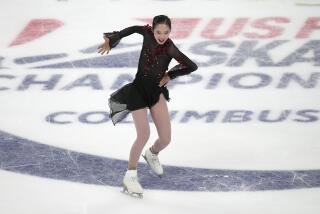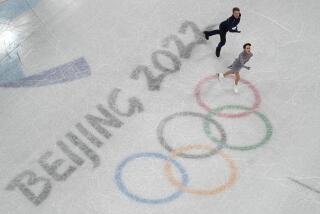Now Kwan Has a Rink of Her Own in Artesia
Michelle Kwan found a sure way to get prime practice times.
The five-time world champion became an owner of the East West Ice Palace in Artesia, which will have its grand opening Monday morning, then will welcome the public that afternoon.
“You remember as young kids watching ‘Cutting Edge,’ and thinking, ‘Wouldn’t it be great to have your own rink?’ ” she said of the skating-themed movie. “I have my own ice rink. Well, not my own, but close enough.”
Kwan is among the investors backing the facility and has made it her training base. Her father, Danny, who also has an ownership stake, helped align local investors, design the building and oversee its construction. He also will manage it.
Keeping it in the family, Kwan’s sister, Karen, a coach and former skater, is director of the skating school, and Karen’s husband, Peter Oppegard, is coaching there. The arena’s name comes from East West Bank, which employs Kwan as a spokeswoman.
The 43,000-square-foot facility includes an NHL-sized rink -- 85 feet wide and 200 feet long -- a fitness center, a dance studio and a snack bar. A gallery will display many of the awards Kwan has won. The rink will be open for public sessions weekday afternoons and from 1 to 10 p.m. on weekends. Skating and hockey classes for all levels of ability will be available, as will dance and exercise classes.
“It’s a great location and encourages not only skating but activity after school,” Kwan said. “People can go in there for health and fitness.”
The Torrance native had trained in Lake Arrowhead since late 2001 but couldn’t always get morning ice time and was tired of commuting from her Manhattan Beach home. She said her coach, Rafael Arutunian, had commitments in Lake Arrowhead through the summer, “but we’ll work together, depending on what happens here.”
She added, “This rink is massive compared to what I’m used to in Lake Arrowhead, so that’s a big change already. The setup is ideal. I can make my own schedule now, and being able to work out off the ice is important because my body is not what it used to be when I was young. I can work there with my trainer and build my strength up.”
Kwan, who will be 25 in July, won a silver medal behind Tara Lipinski at Nagano in 1998 and a bronze behind Sarah Hughes and Irina Slutskaya at Salt Lake City in 2002. She finished fourth at this year’s World Championships, her first competition under the new scoring system. She hasn’t said she will vie for an Olympic berth but acknowledged, “I’d love to. It would be a great experience.
“And if I do end up going for it, it will be a little different because I’m much more experienced. I think Irina has that going for her, and Sasha [Cohen] too.”
*
Hail to the Chief
Ron Hershberger, elected to a full term as president of U.S. Figure Skating last weekend, faces potentially turbulent times.
The San Francisco attorney had finished the term of Chuck Foster, who resigned in February after citing frustration with the International Skating Union and his own organization.
Earlier this month, Val Belmonte resigned as executive director. And Hershberger must preside over the implementation of a new scoring system that can be expensive to operate, knowing that money is tight and will become tighter when USFS’s eight-year, $100-million TV deal with ABC ends in 2007.
Hershberger won the office over Ron Pfenning, the Salt Lake City pairs referee who tried to launch a rival skating federation and was ruled ineligible by the ISU. Hershberger said his priorities were to find a new executive director and build financial resources. U.S. Figure Skating’s annual operating budget is about $16 million and it can draw from a nest egg of $40 million in the U.S. Figure Skating Foundation.
“We’ve been very prudent,” he said. “We’ll try to start a capital campaign and deferred giving.”
Also at last weekend’s session, U.S. Figure Skating adopted the ISU judging system, with the exception that it will publish judges’ names with their marks at U.S. competitions. The ISU doesn’t link names with marks.
“We believe not giving anonymity is the appropriate standard,” Hershberger said. “We believe transparency is a standard that should be respected. This is something we will keep raising with the ISU and to which we are committed.”



